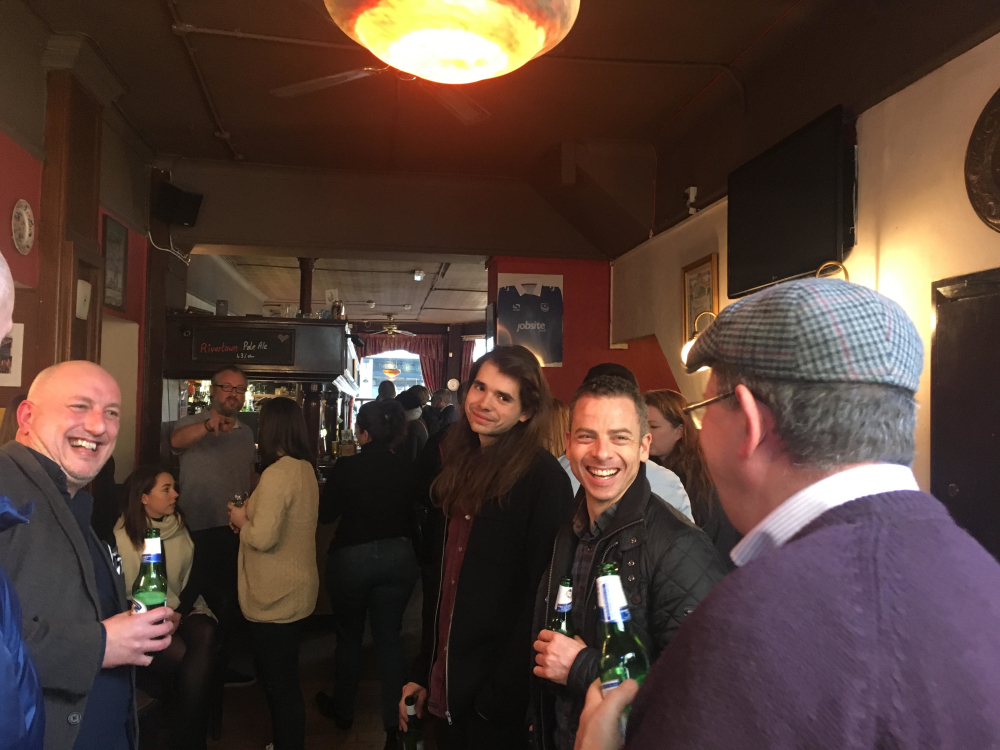#writerscrawl2018 - The big pub scrawl
23 Mar 2018

Combining two of the writer’s favourite past times; the written word and the pub.
The last day of our #writerscrawl2018 week was made up of an evening of pint-sized TED style talks from comedian, Mark Dolan, screenwriter, Darren Murphy and explorer of stories, Dr Jacqueline Johnson around our festival theme, words without boundaries.
Kicking things off the DMA house, the crawl moved along to the first pub where DataTalk managing director, Timy Drye opens proceedings, before introducing key speaker, comedian, broadcaster and writer, Mark Dolan.
Crossing the line in comedy
‘Comedians are never funnier than real life people – just to lower your expectations from the get-go’ opened Dolan ‘we have jokes, but we also have a filter – that is where the boundary comes in’
Speaking on boundaries in comedy Dolan said ‘Experiences teaches you when it is okay to cross the boundaries, knowing your audience and gaining their trust – it is a very privileged thing to hold a microphone’
‘No good comedian in history didn’t push the boundaries, Charlie Chaplin’s material was poverty and devastation’ he continued ‘mocking is a glorious thing’
Opening debate up to the floor, he asked ‘Should all subject matters be on the cards? Is anything off limits?’
Sparking chatter over the limitations and cultural differences, of what is fair to mock and what isn’t Dolan concluded with ‘comedy can be a construct, it isn’t always ‘you’ and that can be hard for an audience to detach themselves from – but well-written jokes really can have a disinfecting quality’
Are boundaries there for a reason?
Our next joint saw Dr Jacqueline Johnson, children’s writer, storyteller and historian address the room:
‘What does words without boundaries actually mean?’ she asked ‘I pondered the question for a long time – because I really do feel that every single word has a purpose, because without a purpose, what are they but patterns on a page?’
Defining a boundary as ‘a real or imagined line that makes the limit of something’ Johnson went on to express her concern for our need to build them, just so we can break them.
‘I worry for our children’ she continued ‘because they are the ones building out future, whether we like it or not – and by constantly allowing these lines to be crossed, are we changing where ideas end up for better or worse?’
Igniting much discussion across the room over the importance of ensuring we are constantly considering every new voice, Johnson retorted ‘But are the most vulnerable members of society truly being spoken to?’
Touching on the #thisgirlcan campaign, Johnson said ‘I’ve seen children use that campaign as ‘this girl can’t’ – seeing the campaign and feeling inferior. I think it is a fantastic campaign, don’t get me wrong, but it is worth considering – does it speak to everyone it intends to?’
Much food for thought.
Boundaries on screen and on stage
‘When I start a screenplay, I start in a world of absolutely no boundaries’ spoke screenwriter, Darren Murphy next ‘and that means anything goes – that is always the place I find most creatively freeing’
He continued ‘For me, all has to be considered to ensure we are representing all – opening your mind to that is a really thrilling thing for a writer, if you create those boundaries for yourself, you are limiting everything you can do and say’
‘You have your world, and then you add in the layers of boundaries – but it can be done so subtly’ he said on his writing process ‘adding in the margins creates the drama, but the drama is also found in your characters smashing through what they thought was their own limitations – there are so many layers to it’
Brand persona: digital vs the real world
The final stop of the evening opened the question of brand identity and the boundaries of digital writing for brands in an increasingly tech-lead world.
Comparisons were drawn between the authentic ‘spotty teenager with fingers covered in Wosit dust’ feel of Blockbusters and the now largely functional experience of a brand like Netflix.
Managing partner at AAR Group, Tony Spong said ‘I really love the idea of brands owning words – verbal identity seems to be all the more imperative in a digital world for me’
Esteemed copywriter, Vikki Ross added ‘I think brands need to go back to basics, look at their values and who they are as a brand, so many are getting wrapped up in digital jargon that they are forgetting who they are’
‘I do think the two can work together’ said junior writer, Arno Bryant of the IDM ‘we are speaking as if there can’t be one without the other, but actually – people are craving authenticity as well as convenience there is a balance to be had’
The creative conclusion drawn ended in a whole-hearted agreement of the role of the writer to constantly questions and push these boundaries as more imperative than ever.
Until next year.
Please login to comment.
Comments